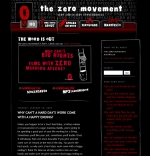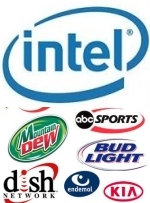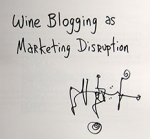Plageristic kleptomania is alive and well, as it always has been, in the ad industry indicated by this AdPulp find comparing an Art Directors Club Italiano 2005 ad to a One Show 2006 ad. While the stick and carrot thing is nothing new, seeing the concept used in very similar ways in the same industry just a year apart is depressing.
There's conceptual speed thing in the Art Directors Club Italiano ad and an almost "who gives a shit" thing in the One Show version so they each create a different feeling but there's no denying the similarities. Perhaps, that was the intent with the One Show ad in that there are so many pointless award shows, why should one care a this donkey clearly doesn't. Certainly, it's possible each ad was created in a vacuum but in our incestuous little industry, that's highly unlikely. We're just going to assume the One Show is simply riffing off the Art Directors Club in a wink-wink, nod-nod sort of way, adding its own snarky commentary on award shows.
It's sort of pointless for an agency to take legal action against a former employee if they end up going to another agency or starting their own agency and a few clients and former employees follow. First, no one forces an employee or a client to shift from the previous agency to the new agency. Agency people are big enough to make that decision on their own. Second, once a client makes the decision to leave, it's not like legal action is going to make them go back. And when the agency decides to somehow legally force an employee to stay when they've decided to leave and join the new agency, that's kind of pointless too. Short of shackles and a police escort, if someone doesn't want to show up for work, there just not going to.
more »
Capitalizing on Friday the 13th fears, Greenpeace, through The Viral Chart, has released an online video (here too) that, with compelling imagery, claims building more nuclear plants is an invitation to terrorists 911-style. Sarah North, head of Greenpeace's nuclear campaign, said, "Millions of people could die as a result of a terrorist attack on a nuclear plant. This is a totally unacceptable risk. This film shows that building new nuclear power stations is a catastrophic gift to terrorists."
more »
To appeal to men, many soft drink makers have dropped the word "diet" from the name of their products or introduced newly named products. In Coke's case, there's Coke Zero. A clandestine element of the campaign urging men to consume Coke Zero is a weblog, with no mention of Coke's involvement (Note: apparently in reaction to negativity about this effort, the page is now clearly branded with a Coke Zero bottle), named The Zero Movement on which a guy rants about why life is so full of stuff to do and how it would be so much nicer if there was, well, zero to do. It's written in typical character blog prose, devoid of personality and full of whiny banter which comes off like it's a product of a creative brief. There's even fake, supportive comments to go along with it.
While the blog's archives indicate the site's been up since June, 2005, Whois information tells a very different story. Not only does the information reveal the site is a product of Coke, it clearly states the domain for the site was registered November 21, 2005, a full five months after the site, according to its archives, launched. On top of this, blog monitoring service BlogPulse has little to no information on the blog. Had The Zero Movement blog been pumping out posts since June 2005, BlogPulse would have had a sizeable profile for the site. Blog search engine Technorati, aside from some recent referrals, doesn't have much either. In creating The Zero Movement, Coke has lied, misled and misrepresented. Some would call this reprehensible and irresponsible. We'll just call it stupid.
more »
Thanks to Hurt Elbow, we now have visual proof the new Intel logo leaps ahead of nothing and simply joins the "logo ovalation" crowd. Check out all the unoriginal, copy-cat insanity here in one gigantic, orgasmic ovalistic circular logo-fest that either proves originality is dead or that all these brands used the same focus group.
So we've finally jumped on the podcasting bandwagon or, at least, we've hitched a test drive with an appearance as guest host on Across the Sound. A few months ago, Joe Jaffe and Steve Rubel launched Across the Sound which covers new marketing, media and PR. In late December, Steve Rubel had to back out to focus on other commitments and Jaffe decided to bring on some guests hosts. Timidly, we raised our hand while, at the same time, cringing at the thought of hearing our own voice uttering non-sequitors and pointless blather we so often relish trashing here on Adrants.
During the podcast, we rambled on about the genesis of Adrants, Brandweek's fascinating insight into the apparent pointlessness of blogs, those three year old PUMA spoof ads (more here, here, here and here), Sprint's Ambassador Program, cable news network screw ups, Stormhoek wineries who doubled sales in less than 12 months by leveraging a blog campaign in the sales process and Intel's poor choice of tagline.
more »
Last Friday night, NBC aired the initial episode of The Book of Daniel, the show that unnecessarily had everyone's frocks in bunch last week because, God forbid, it mixed the topic of religion with a frothy dose of humor and human imperfection. Not dainty Starbucks-style froth but full-on, blender-busting froth in the form of a pill-popping priest, a gay son, a martini-swilling wife, a daughter who sells pot to support a manga cartoon hobby, another son who likes to have sex with a bishop's daughter, a priest who cheats on his wife, a relative who steals $3 million from the church, a mafia-connected priest who blackmails the pill-popping priest and a self-referential, wise-cracking Jesus who doles out less than traditional religious advice. Four NBC affiliates couldn't take the heat and pulled the show from their schedules.
Upon viewing the two hour premiere, we just don't know what all the fuss is about. The show was funny. Really funny. It took the very serious subject of religion, did away with the usual collection of unrealistically pious people and turned the whole thing on its head by dropping the kid gloves to portray people as they are in real life, full of flaws, faults and foibles.
more »
Somehow during the long history of America's creation with all its focus on freedom and supposed acceptance of just about anything, someone forgot to realize there's nothing with the normal portrayal of the human body in its natural state. No, we have to somehow equate nudity to the downfall of mankind and the catalyst for a nationwide orgy resulting in a country-wide orgasm of cataclysmic proportion causing the destruction of the moral fabric that binds our United States together.
In Prague, they just put nude ads up and no one blinks an eye.
It happens to the best us us. We come up with a great idea. Get all high and mighty about how we're not going to be like everyone else. We promise not to sink into the gutter and use all the tired, old tricks to attract attention. We vow to be virtuous and laud ideals and intellectualism over insipidness. Then it happens. No one watches us. No one's heard of us. Our primary competitor towers over us and we are lost in a sea of television stupidity. Do we continue to stay the course? Do we try to beat them? No, sadly, we throw in the towel and join them.
After playing second fiddle to Lifetime for so long, Oxygen just can't stand it any longer and is pulling out the trump card of last resort: sex. Rather than rise above the misty-eyed success of Lifetime with higher brow offerings, Oxygen network has joined the titillation crowd with offering like "Talk Sex With Sue Johnson" and its new series, "Campus Ladies," a show that will somehow make the scenario of middle-aged, suburban women going back to college and frolicing with undergrad hotties funny.
more »
Gapingvoid blogger Hugh Macleod worked with U.K. wine brand Stormhoek to use blogging as a means to increase sales. It worked. Big time, doubling sales in less than 12 months. The increases didn't come from the hundred or so bottles he sent out to U.K. bloggers who might blog about it and get a few of their friends to buy a bottle. Surely, they did drink the wine and did blog about it but the big increase in sales came from what Macleod calls The Porous Membrane, the wall between internal brand conversations and external consumer conversations.
Macleod posits blogs are a good way to make things happen indirectly and that they are disruptive to the status quo. To double sales inside of a year can't possiblely come from a few more people drinking a couple of bottles of wine. It can, however, come from a vastly improved internal attitude and sales process. The simple fact that the wine was out there and was being blogged about became part of the story telling sales process. As the sales force went out to supermarket buyers and importers, there was a new, different and exciting story to tell. Additionally, a retail outlet is far more likely to take on an increased inventory if it knows the product is getting talked about. The mindset is that if they're talking, they're more likely to buy. That's exactly what happened.
more »

|
|











